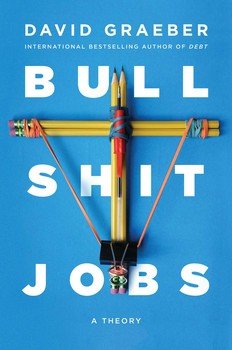Modern office buildings do everything in their power to make work attractive. They create flexible work spaces, hangouts with hammocks, slides in-between stories, meeting rooms with goofy themes (do you want to hold your pitch in the Ball Pit or the Cat Lovers Chamber?).
But all these frills cannot hide the fact that a full-time office job will slowly suck the soul out of your body.

Full-time Balderdash
After we graduate, we are motivated to the bone to get started. We will do things differently things differently, full of youthful gusto. We want to make an impact and make the world a little better. Then you begin your first real job, and you instantly hit a brick wall.
You get an inside look of those big corporations. The big brands we adored as a kid, turn out to be not so cool at all. On the inside, the work is all the same. The same offices, the same canteen, the same spreadsheets, the same 9 to 5 working hours. At least on paper. You and your colleagues have to work their asses off; sick leave is soaring due to overwork and burnout.
There will be conflicts between your own ideas and ideologies, and those of the company. Turns out the company is less committed to the issues they advocate after all. All those fine words on innovativeness, diversity and lowering the carbon footprint; it was mostly for good PR.
Every marketer knows, brand image is formed by association.
*”People are posting black squares again, should we put our B/W logo back? Or do you want to keep the rainbow colors for now?”
– “Good eye! Change it, Gary.”*

The Office Contraption
If you look through all the embellishments, office buildings are a form of voluntary incarceration. You clock in daily and have to perform certain actions under supervision to keep your boss satisfied. Sure, you can pick the job, your boss and choose to be held somewhere else. But there is no escaping your life sentence of 40 to 50 years, if you allow yourself to be chained to office chairs.
What is your work about?
Seriously, ask yourself what you’re doing at work. How much of your time is spent sending internal e-mails? How many meetings could you eliminate from your schedule? What is the most important project you are working on right now? Is it really important?
Wretches and Kings
The bigger the organization, the more you are just a cog in vast, unwieldy machine that is out to maximize profits. A multi-tiered system with artificial layers that make the hierarchy of the organization clear. Down the ladder, your cog is unable to impact the machine’s workings.
Shareholders are the overseers and make sure the machine keeps running. They were quick to invest, they’ve delivered their input. Now it’s up to the workers to keep the machine running diligently, so that the machine outputs heaps of dividend.
But shareholders are not truly invested, with anything other than money. They don’t care so much about problems in the workplace, nor about viable, innovative alternatives that could possibly jeopardize their return on investment. Plus they can only base their opinion on the available information. A slick presentation by the board — which you, by the way, put together in the late hours — puts all the stakeholders at ease.
The vision often consists of nothing more than a collection of buzzwords. Managers are given a course in SCRUM, Agile, Lean, or whatever other STD (Sacred Teamwork Doctrine), and suddenly everyone must devote himself to this revolutionary management style.
Who doesn’t enjoy those daily standup meetings with questions like: How are you going to empower yourself? What obstacle are you going to overcome today? What is your confidence level regarding your sprint backlog?
Accepting Your Fate
For the first few years, you were still baffled by the inner workings of the organization. But you’ve went through so much that nothing surprises you anymore. From your friends at other companies you hear that things are no different there. A comforting thought.
New interns come knocking at your door when they are confused. You reassure them that it’s not their fault. When you were in their shoes, you were just as bewildered. But you found your way through the office jungle and built up a safe camp. You get a decent pay and are able to delegate most of the stuff you don’t like to do.
Submission can be a form of freedom. Employment takes away all the nagging questions about your future, with job assessments and promotion prospects prescribing a trajectory for you to follow.
From here, it’s one long bridge from adolescence to retirement, walking at a slow, compliant pace.
But what if you don’t have to walk that long bridge to retirement?
What if you chose a different path than your colleagues at the office? You only get one shot at making this life unique, why would you choose to walk virtually the same bridge that generations before you also traveled?
How To Escape Office Life
You can take a chance and start a self-employed career. As an independent entrepreneur or freelancer, you can choose how you cross the bridge to retirement. You can do short sprints, build a vehicle that gets you across or just wing it.
If you seem to be headed into the abyss, you can always count on one of the social safety nets that are stretched under the bridge. Particularly in Western-Europe and North-America, you can always find support in family, friends or government aid. Besides, you can always get back to working a regular job again. Entrepreneurship is a reversible endeavor, and can also be done in tandem with part-time employment to give you some financial stability.
Many will say they currently lack the expertise required for building a business. But employment will never teach you entrepreneurial skills. Your experience will come naturally from trial-and-error, overcoming failure and putting money on the line.
Running a business is groping in the dark. There is no higher power that helps you progress; that knowledge has to come from within you. In this regard, entrepreneurship can be a lonely path, especially in the beginning. Others will respect your decision to start for yourself, but quietly they may wish you to fail. If you fail, they will perceive it as a validation for their own, safe career path. You’ll be eager to prove them wrong. And when you overcome your own failures and manage to build a successful business, it will be more rewarding and insightful than any order from a boss.

Bullshit Jobs: A Theory
by David Graeber
In his book Bullshit Jobs, David Graeber argues that at least half of all widely-accepted office jobs are meaningless, and they can become mentally devastating when coupled with a work ethic that associates hard work with self-worth.





